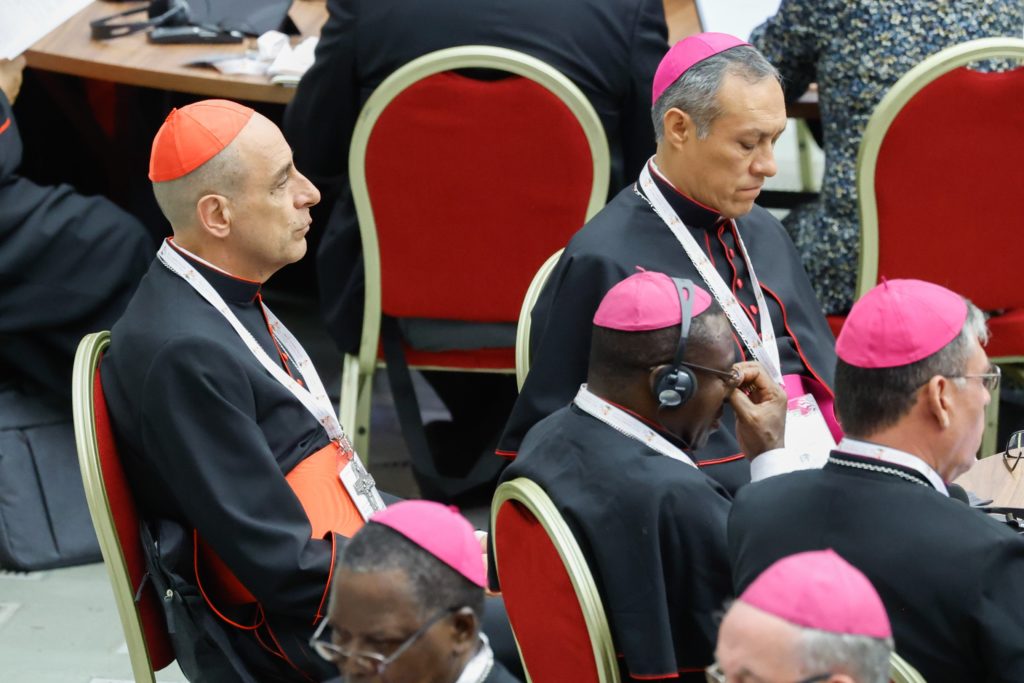ROME — During the peak of the Watergate scandal in the early 1970s, President Richard Nixon became infamous for prefacing his rambling efforts at self-defense with the line, “Let me make one thing perfectly clear.”
Observers soon learned that when those words passed Nixon’s lips, whatever followed might be many things, but clarity was unlikely to be among them.
The memory comes to mind in light of the various efforts at clarification being issued these days by Argentine Cardinal Victor Manuel Fernández, Pope Francis’ doctrinal czar, regarding the Dec. 18 declaration Fiducia Supplicans, authorizing Catholic priests to offer nonliturgical blessings of same-sex couples.
The latest such attempt to clear things up came Jan. 4, in the form of a press release from Fernández and his top deputy, Italian Msgr. Armando Matteo, regarding reception of the declaration. Perhaps the first thing to note is that at 2,200 words, the press release is half as long as the document it seeks to clarify — mathematically, anyway, suggesting that after a mere fortnight’s frenzied reaction, virtually every other word in the original text needed some sort of explanation.
Certainly, it’s hard to remember the last time a prefect of what was once known as the “Holy Office,” and which is historically the successor to the Roman Inquisition, felt compelled to issue a public statement denying that his previous declaration contained anything “heretical, contrary to the tradition of the Church or blasphemous.”
The press release capped what had been a spiraling series of media interviews by Fernández, including a Jan. 3 interview with the German newspaper Die Tagespost, in which he called the document a “clear answer” to Germany’s effort to codify formal liturgical blessing ceremonies for same-sex couples.
That interview seemed to create yet another bit of confusion: If the point was to deliver a verdict on a single nation, why did the Vatican choose to speak to the entire universal Church, publishing the first formal declaration from the Holy Office since Dominus Iesus in 2000, almost a quarter-century ago?
Of all the unanswered questions about Fiducia Supplicans, however, perhaps this most basic one is the following: Does any of this really matter? Or, are we witnessing the latest Catholic cycle of sound and fury signifying relatively little?
It’s a well-documented fact of Catholic life that sometimes we argue over things that seem to have a great deal of symbolic importance, but which, over time, are revealed as less sweeping or monumental than we originally thought.
To take one example, Anglophone Catholics of a certain age will recall the titanic battles fought in the 1990s and 2000s over the new English translation of texts used in the Mass, known collectively as the “liturgy wars.” Oceans of ink were spilled arguing over matters such as “dynamic equivalence,” and whether it’s appropriate to use relatively obscure terms such as “consubstantial” and “oblation” in the people’s parts of the prayers.
Supporters of the new translation predicted it would stir a liturgical renaissance of deeper and more reverent celebration. Critics forecast a liturgical exodus, as people would be so alienated by the remote and unnatural language they would vote with their feet against it.
Now that we’ve been living with the new texts for more than a decade, it seems abundantly clear neither the best-case nor the nightmare scenarios have materialized. In fact, the towering lesson seems to be instead that translation, while undeniably important, just isn’t the heart of the liturgical experience.
Where a worship community is welcoming, music is stirring and preaching is gripping, the liturgy will come alive no matter what translation is used; conversely, where a community is cold, music banal and preaching uninspired, no translation will make much difference. We argue over translation because it’s the sort of thing that can be settled by committee, but the real difference-makers in the liturgy are all retail.
To come to Fiducia Supplicans, there’s a reasonable case to be made that it’s another case of tremendous sizzle without a great deal of steak.
To begin with, the document doesn’t prohibit or require anything. It simply authorizes priests to make case-by-case determinations as to whether a blessing is appropriate in a given set of circumstances. Bishops and pastors inclined to say “yes” probably were already doing so, albeit perhaps more quietly and circumspectly, while those disposed to say “no” aren’t being compelled to change their tune.
Indeed, Fernández himself has more or less endorsed the positions of several African bishops’ conferences in concluding that such blessings are inappropriate in their contexts, as long as such discretion doesn’t imply a “a total or definitive denial” of the document’s teaching.
It’s also reasonable to wonder how much pent-up demand for such blessings there actually is. While there’s a sizable “LGBT community” in the Catholic world, a healthy percentage of those folks don’t go to church. Many of those who do have already found a home, often in sympathetic parishes where the pastor was already known for finding creative ways to offer a blessing on their lives well before Pope Francis, Fernández, or Fiducia Supplicans came along.
In addition, at least some of those practicing Catholics who identify as LGBT may not even want such a blessing, feeling that despite the best of intentions, it still falls short of the full marriage equality they seek from the Church.
In other words, no matter how much dust it may throw up on social media and in op/ed pieces, the extent to which Fiducia Supplicans actually will change the situation in the trenches remains to be seen. It may well be that for most meat-and-potatoes Catholics, it’ll be another case of something that caused great consternation at the time but is actually hard to remember a year or so after the fact.
In the end, the answer to the question of how much will really change is something that only time, and not repeated explanations from authority, is likely to make “perfectly clear.”

